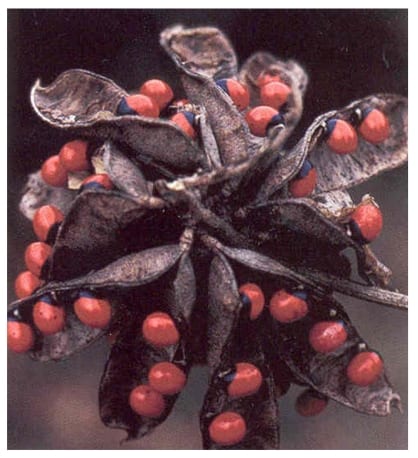Identifying Toxic Plants – Love Bean/Rosary Pea
The Rosary Pea (see alternative names below) is a plant which has been used around the world for the production of various things, from aphrodisiac drugs, to jewellery and percussion instruments. The jewellery is produced using the beautiful seeds from this plant, which also happen to be extremely toxic. A single seed can kill a human being. It is also unsafe to inhale.
According to the NIH:
‘Abrus precatorius is a vine native to India and other tropical and subtropical areas of the world. Since introduction to Florida and the Caribbean, it is now commonly found throughout these areas and in the southern United States. It is known by a variety of names, including jequirty bean, rosary pea, prayer bead, crab’s eye, and love bean. The vine has pods with oval seeds and a hard glossy shell. The seeds vary in color, from red, black, orange or white with black and white centers (Figure 1). While all parts of the plant are toxic, the highest concentrations are found in the seeds. Due to their appearance, the seeds are often used for jewelry, beadwork and ornaments.’

Other things you should know: Ingestion of the intact seed may not necessarily kill you as it passes through the gastrointestinal tract due to its hard shell. The crushed seeds can kill you several days after ingestion, so be sure to see a doctor immediately if you mistakenly ingest these seeds. Don’t risk eating the seeds intact either. Beware of anyone that tries to administer any part of this plant for medicinal reasons. Mankind has a long history of administering poisonous substances as medicines because they were ignorant.
The potent toxin this plant contains is a toxalbumin called abrin. To learn more about abrin poisoning, use the following contact information:
- Regional poison control center: 1-800-222-1222;
- Centers for Disease Control and Prevention;
- Public Response Hotline (CDC): 800-CDC-INFO;
- 888-232-6348 (TTY);
- E-mail inquiries: cdcinfo@cdc.gov;
Other names for this plant:
- Precatory Bean;
- Crab’s Eye;
- Castor Bean;
- Indian Licorice;
- John Crow Bead;
- Akar Saga;
- Jequirty Bean;
- Prayer Bead;
- Love Bean;




